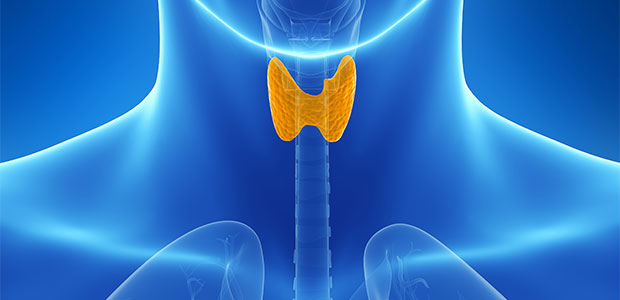
Thyroid Disease and Infertility
If you’ve been diagnosed with a thyroid disorder you are not alone. Approximately 20 million people in the U.S. are affected by thyroid disease. According to the American Thyroid Association, more women than men suffer from too much or too little thyroid hormone. In fact, it is estimated that one in eight women will develop a thyroid disorder in her lifetime.
Thyroid disease can cause weight problems, hair loss, fatigue, depression and insomnia. It can also cause significant reproductive issues. If you are hoping to grow your family, it is important to know how your thyroid functions, how it may impact fertility, and what you can do about it.
What is the thyroid gland?
The thyroid gland is the butterfly-shaped organ you can feel at the base of your neck, just below the larynx (voice box). It is part of the endocrine system, which is made up of the glands that produce, store and release hormones into the bloodstream so they can reach cells throughout the body.
Specifically, the thyroid gland makes two important hormones: triiodothyronine (T3) and thyroxine (T4). These hormones control metabolism—the way your body uses energy—and regulate vital body functions including breathing, heart rate and body temperature. If a woman’s thyroid produces too much or too little of these hormones, this imbalance also can have an effect on her ovaries, making it more difficult to get pregnant.
What causes thyroid disorders?
The thyroid can malfunction in one of three ways:
- It can release too much thyroid hormone, a condition known as hyperthyroidism or overactive thyroid.
- It can release too little thyroid hormone, a condition known as hypothyroidism or underactive thyroid.
- Thyroid tissue can overgrow, resulting in a nodule or small lump in part of the gland. While most nodules are benign, they can become large enough to cause difficulty swallowing. They may also become overactive, suppressing the rest of the gland and causing hyperthyroidism.
What’s role of hyperthyroidism in reproduction?
Too much T3 and T4 in your body can cause:
- Anxiety
- Hand trembling
- Brittle hair
- Increased appetite
- Weight loss
- Irritability/moodiness
- Sensitivity to high temperatures
- Rapid heart rate
- Missed or lighter menstrual periods
Research indicates that thyroid disorders can cause significant reproductive problems in women. One study, published in The Obstetrician & Gynecologist earlier this year, found that 2.3 percent of women with fertility problems had an overactive thyroid, compared with 1.5 percent of those in the general public. The report’s authors suggest that testing for thyroid disease should be considered for women who have trouble getting pregnant or those who have experienced early pregnancy loss.
Most women with hyperthyroidism are able to conceive. However, the thyroid condition should be treated and monitored by a doctor to protect both the woman and her baby during pregnancy. Left unchecked, hyperthyroidism can lead to pregnancy complications, such as a spike in blood pressure late into the pregnancy, as well as premature delivery, low birth weight or even miscarriage.
Does hypothyroidism affect fertility?
Too little T3 and T4 in your body can cause:
- Depression
- Difficulty concentrating
- Dry skin
- Hair loss
- Weight gain
- Constipation
- Joint and muscle pain
- Sensitivity to cold temperatures
- Tiredness and fatigue
- Trouble sleeping
- Frequent, heavy periods
Hypothyroidism affects about 0.5 percent of women of reproductive age. It is also linked with menstrual problems and a lack of ovulation in some cases, according to researchers.
It can occur spontaneously, develop during or after pregnancy, or after treatment for hyperthyroidism. You can also be born with this condition. In children, the condition is associated with a delay in reaching sexual maturity.
Can thyroid disease cause male infertility?
Male infertility has many causes—from hormonal imbalances to anatomical problems to genetic defects. Although thyroid disease is often considered a women’s problem, about one-third of hypothyroidism cases arise in men. If left untreated, an underactive thyroid can lead to male infertility.
Studies show that low thyroid hormone levels in men can cause poor semen quality, low sperm count, reduced testicular function, erectile dysfunction and a drop in libido. Once hypothyroidism is diagnosed in a man with fertility problems, bringing thyroid hormone levels back into the normal range usually restores erectile function. In most cases, problems related to sperm quantity and quality also improve over time.
Diagnosis and treatment
There are a number of medications that can help to improve thyroid function in both men and women. Talk to your doctor about your options, particularly if the medication you currently take is not helping your symptoms.
Getting your thyroid checked—especially when seeking fertility treatments—and finding the right treatment plan may increase your chance of pregnancy, decrease the miscarriage risk, and improve the health of your baby.
According to the American Society for Reproductive Medicine, you should seek the care of an infertility specialist if you are unable to achieve pregnancy after 12 months of unprotected intercourse. If you are over the age of 35, the time of trying to conceive is reduced to six months. You should also seek the care of a specialist if you have had more than one miscarriage.

